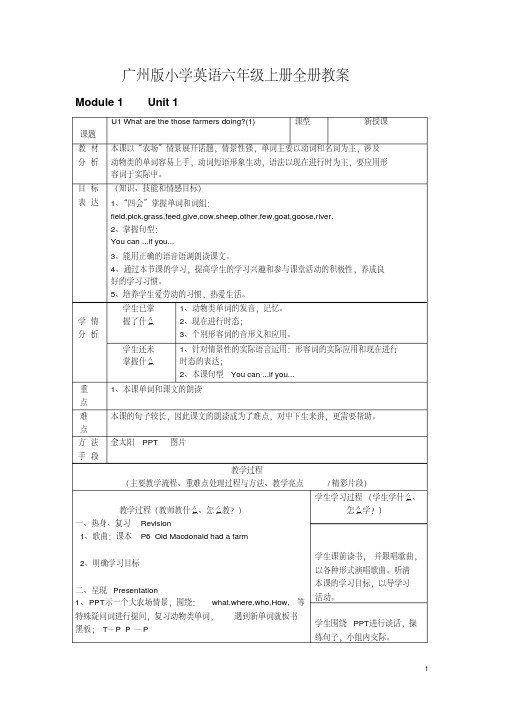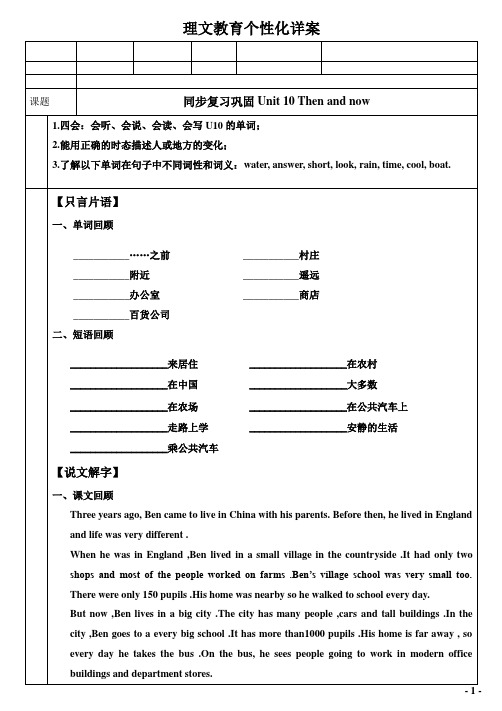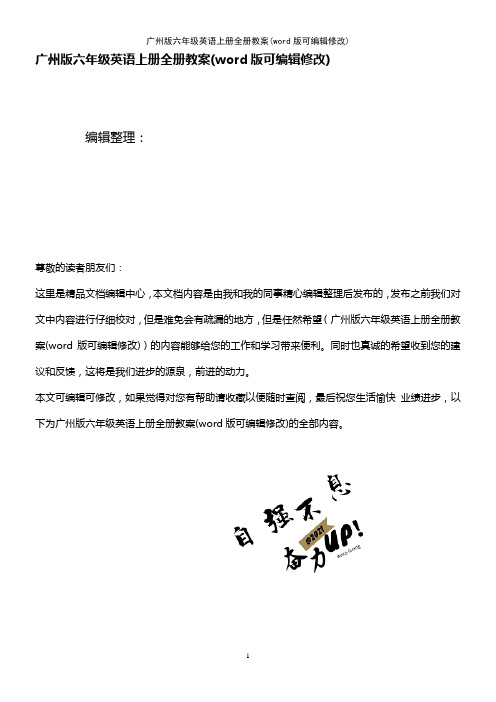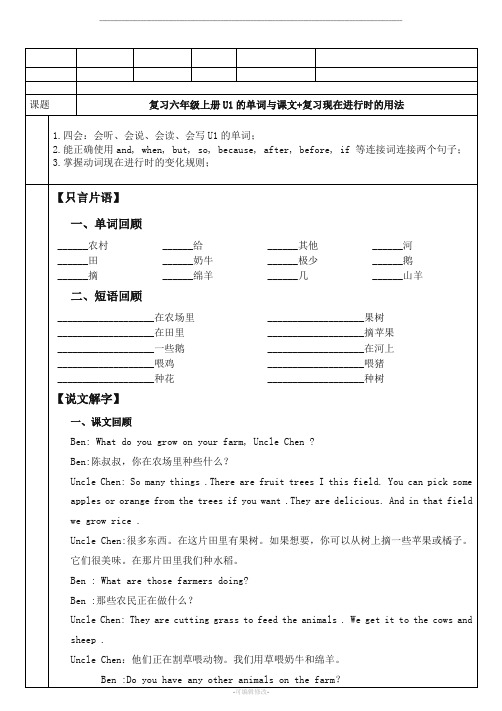新版广州小学英语六年级上U10教案
六年英语上教学设计Unit10(3)

left a note
留便条
return the book
还书
教
学
过
程
6.请学生读第二段,小组讨论后完成补充句子。板书动词短语。
7.引导学生朗读三四段,小组内合作补充完整句子。
8.分角色朗读课文。
Step3:Consolidation
1. 听录音初步理解笑话大概含义。
2.讲解看地图的方法。
Step4: Homework
3.通过本课学习养成主动承担力所write中的内容.
教学
难点
理解动词短语left a note, return the book, buy some vegetables的含义和读音。
教学
准备
课件图片等。
教
学
过
程
Step1: Warming up
利用询问帮妈妈做事情出示几个问题,引入新课。
复述 read and write 中的内容。
个人设计
利用学习知识教育学生明白一些生活道理
会描述四个方向词
板
书
设
计
Unit10
Where is Billy going?
What is he going to do ?
left a note return the book,
north south east west
Step2: Presentation
1.出示图片,默读课文。
2.出示问题:Where is Billy going? What is he going to do ?
3.同桌之间互相讨论并回答问题。
4.看第一幅图读第一段,回答Is mom in?教师帮助学生回答。
最新六年级英语上册Unit10Thenandnow广州版优选教学课件

Period 1
Learning aims
1.我能听懂课文内容,并回答问题。【Task 1】 2.我能在课文中划出问题的答案。【Task 2】 3.我能复述课文的内容。【Task 3】 4.我能运用本课学习的句型,说说我生活中
的一些变化。【Task 4】 【Task 5】
They work in modern office buildings and department stores
4. Why does Ben like the city?
Because there are many things to do and he has lots of friends.
Let’s choose
ago village
far away office most nearby department store
1. My home is nearby , so I can go to school on
foot. But my father works far away. He has to go to work by car. 2. A village life is a healthy life. 3. Ten years ago , I was a little boy. But now
Let’s recite.
Ben lived in England before. But three years ago , he came to live in China with his parents. There are many differences between the two cities.
新广州版小学英语六年级上册全册教案参考资料

学生围绕 PPT进行谈话,操 练句子,小组内交际。
四、发展 Development 1.T 示二张农场图片,以小组形式根据问题的提示完整介 绍 其中的一图片 What does ...grow on the farm ? What animals does ... have ? What are the farmers doing ? How many...are there...? 2. 听写单词 五、小结 1、提问方式以学生讲自己这节课的得和失。 2、把自己听写出现错误的单词改正后抄写一行。
动物类的单词容易上手,动词短语形象生动,语法以现在进行时为主,要应用形
容词于实际中,本课时主要操练课文,特别是长句子。另外,动词短语要熟练应
用于 what ...doing? 中。
(知识、技能和情感目标)
1、“四会”掌握单词和词组:
field,pick,grass,feed,give,cow,sheep,other,few,goat,goose,river.
学生做 Uncle Chen ,根据 文字及图片提示回答。
4. So I have many ,, some,, a few , and , on the farm. 5.There are also many plants on my farm. We grow peppers and potatoes in this field. And in that field we grow onions and broccoli. 5 、 Look & say. 复习植物类单词
1. Let ’s talk. P3 动词短语为主
利用图片及动作引导学生说出 cutting grass; give 等动词
广州教科版六年级英语上册Unit10Thenandnow讲义(学生版)

Unit 10 Then and nowFocus PointsLet’s TalkDo you like city life? Can you tell me what is the difference between the country life and the city life? Please share your ideas with your partners.Warming Up一.听写__________________________________________________________________________________ __________________________________________________________________________________ __________________________________________________________________________________ __________________________________________________________________________________二.单词及短语1.……之前__________________2.村子,村庄_________________3.附近______________________4.遥远_______________________5.办公室____________________6.商店_______________________7.百货公司__________________ 8.大多数人___________________9.乘公共汽车________________10.走路去上学________________11.在那以前_________________12.安静的生活________________13.一个小村庄_______________三.课文内容根据提示把短文补充完整。
外研版小学英语六年级上册单元教案-Module10教案

外研版小学英语单元教案Module 10知识与技能:全体学生能朗读课文,阅读相关短文,并能按要求完成语句书写。
过程与方法:运用已学语言谈论行为规范和交通规则。
情感态度与价值观:在学习和日常交际中,能初步注意到中外文化的异同,乐于感知并积极尝试使用英语。
第一课时Unit 1 Don’t talk in the library.【教学目标】:知识与技能:Don’t talk in the library.Please stand in line.过程与方法:讲授法、情景导入法、师生互动、游戏法情感、态度和价值观:使用祈使句发出指令或要求;能够遵守规章制度,执行指令【重点】:本模块的单词及句型【难点】:祈使句的用法please, don’t【课时安排】:1课时【教学过程】:(一)导入:一.复习:1.带领学生复习上节课学习的韵诗: Do you want to go to the sea ?2.复习学习过的动词。
二.任务呈现与课文导入;1.给学生播放一段表现学校中的违规行为的录象片段,如:上课时看课外书,在楼梯上追逐打闹等。
老师一边播放一边问学生:录象中的学生在作什么?当你看到这个情景时,你想对他说些什么?引导学生说出:Please listen to the teacher ! Don’t run on the stairs !老师把句子写到黑板上。
2.老师告诉学生,录象里的学生违反了学校的哪些行为规范。
询问他们还知道学校的哪些行为规范。
引导学生尽可能多的说出不同场合的行为规范或规章制度。
3.告诉学生:今天的课文就是关于图书馆中的规章制度的。
学习之后,大家可以试着给学校的一间公共教室制定一份规章制度。
(二)探究新知:给学生播放一段表现学校中的违规行为的录像片断,例如:上课时看课外书.在教学楼的楼梯上追跑打闹等。
老师一边播放一边询问学生:“录像中的学生在做什么?当你看到这个情景,你想对他们说些什么?’引导学生说出:“Please listen to the teacher! Don’t run on the stairs!”老师把句子写到黑板上。
2016新版广州六年级英语上册U10 详细教案

理文教育个性化详案Ben loves the city .There are many things to do and he has lots of friends .But sometimes he misses the quiet life of his English village.译文:三年前,Ben 和他的父母来到中国居住。
在那以前,他住在英国,生活很不一样。
在英国时,Ben住在农村的一个小村庄里。
那里只有两间商店,大多数人在农场工作。
Ben的乡村学校也很小。
只有150 个学生。
他的家(离学校)很近,所以他每天走路上学。
但是现在,Ben住在一个大城市。
城市里有很多人、汽车以及高大的建筑。
在城市里,Ben去一间很大的学校上学。
学校有1000多名学生。
他的家(离学校)很远,所以他每天乘公共汽车上学。
在公交车上,他看见很多在现代化的办公室以及百货公司工作的人。
Ben喜欢这个城市。
(那里)有很多事情可以做,而且他有很多朋友。
但是,有时他想念他的英国村庄的宁静生活。
二、句子回顾A.翻译下列的句子在英国时,Ben住在农村的一个小村庄里。
______________________________________________________________________________ 三年前,Ben和他的父母来到中国居住。
______________________________________________________________________________ 在那以前,他住在英国,生活很不一样。
______________________________________________________________________________ 在英国时,Ben住在农村的一个小村庄里。
______________________________________________________________________________ 大多数人在农场工作。
广州新版六年级英语上册Unit 10 Then and now

Unit 10 Then and now只言片语……之前__________ 来居住___________ 在中国___________遥远________ 很不同________ 在农村_________在农场________ 大多数_________ 走路上学__________在公车上_________ 乘公车_________ 安静的生活_________说文解字Three years ago, Ben came to live in China with his parents.【添砖加瓦】ago ……之前ago前面加时间段,用来表示过去的时间。
一周前__________ 几天前__________ 五年前__________It’s famous for its fish and rice.【添砖加瓦】be famous for 因为……而出名;以……闻名辨析:be famous for, be famous as, be famous to1). be famous as 后一般跟人,表“做为......人而闻名”如:Lu Xun is famous as a great writer.2). be famous for 后一般跟事物,表“因/由于......而闻名”如:Lu Xun is famous for his great novels.3). be famous to 后一般跟人,表“对......是熟悉的”,“为......所熟知的”如:Yao Ming is famous to most young people.【牛刀小试】1. The area ___________ its green tea。
2. Mark Twin ___________ a children-story writer.3. Beijing ___________ the Great Wall.4. Jay Chou ___________ a singer.5. Sichuan food ___________ its hot pot.On the bus, he sees people going to work in modern office buildings and apartment stores.【添砖加瓦】分析:这个句子含有see sb. doing的结构,“看见某人做某事:可以用see sb. doing 或see sb. do。
六年级上册英语教案-Module10

六年级上册英语教案Module 10.Unit 2 Go straight on 外研版(三起)教学内容本单元围绕“问路和指路”的主题,教授学生如何使用英语询问路线和方向。
课程内容包括词汇如“left”、“right”、“straight on”、“turn”等,以及相关句型如“Excuse me, where is the ?”和“Go straight on, then turn left/right.”。
还包括对这些句型和词汇在具体情境中的应用。
教学目标1. 知识与技能:学生能够理解并运用本单元的词汇和句型进行问路和指路。
2. 过程与方法:通过情境模拟、小组合作等教学方法,提高学生的英语听说能力。
3. 情感态度与价值观:培养学生对英语学习的兴趣,增强他们的合作意识和解决问题的能力。
教学难点1. 词汇记忆:学生需要记住与方向相关的词汇,如“left”、“right”等。
2. 句型应用:在实际情境中正确运用问路和指路的句型。
3. 发音准确:确保学生能够准确发音,特别是新词汇和句型。
教具学具准备1. 教材:六年级上册英语课本。
2. 多媒体:PPT课件,包含词汇、句型及情境模拟。
3. 教具:方向指示牌、模拟地图。
4. 学具:学生笔记本、彩色笔。
教学过程1. 导入:通过展示一张城市地图,引导学生用中文讨论如何从一处地点到另一处。
2. 新授:介绍新词汇和句型,通过PPT展示和实际演示帮助学生理解。
3. 练习:小组活动,学生模拟问路和指路的情境。
4. 巩固:通过游戏或角色扮演活动,让学生在实践中运用所学知识。
板书设计中心:课程“Module 10.Unit 2 Go straight on”左侧:列出重点词汇右侧:列出重点句型作业设计1. 书面作业:完成教材后的练习题。
2. 口头作业:与家长或朋友用英语进行问路和指路的对话。
3. 扩展作业:制作自己的小地图,并用英语标注路线。
课后反思课后反思将围绕学生的参与度、教学方法的成效以及课程内容的掌握程度进行。
广州版六年级英语上册全册教案(K12教育文档)

广州版六年级英语上册全册教案(word版可编辑修改)
广州版六年级英语上册全册教案(word版可编辑修改)
编辑整理:
尊敬的读者朋友们:
这里是精品文档编辑中心,本文档内容是由我和我的同事精心编辑整理后发布的,发布之前我们对文中内容进行仔细校对,但是难免会有疏漏的地方,但是任然希望(广州版六年级英语上册全册教案(word版可编辑修改))的内容能够给您的工作和学习带来便利。
同时也真诚的希望收到您的建议和反馈,这将是我们进步的源泉,前进的动力。
本文可编辑可修改,如果觉得对您有帮助请收藏以便随时查阅,最后祝您生活愉快业绩进步,以下为广州版六年级英语上册全册教案(word版可编辑修改)的全部内容。
1
2
3
4
Feedback:
5
6
Feedback:
8
9
10
Feedback:
Feedback:
Feedback:
板书设计:
Feedback:
板书设计
Feedback:。
小学英语六年级上册十模块 教案

互学 阶段
words about language and snacks. Work in four: find the sentences about how to ask questions about express have/has got.... Ask the students to find Underline the sentences about how to ask out and underline the questions about expressing Have you got...Has sentences. she/he got ... Ask and answer.
1.Words collection.(规则、指令) 2.Cultural reading (Know more about how to write a letter to the pen friend)
Set up the Pre-class homework before learning.
互学 阶段
1. Greetings. Help Ss answer: Open your book Point to... Stand up. Sit down. Go straight on. Turn left/right. Ask some questions about library rules.
T shows red,yellow and green lights. Ask :Cross or Don’t. Add: wait. Have Ss look at PPT ,and talk about the pictures. Lead Ss to say the sentences like: Don’t... Walk/Go.
六年级上册U10第3课时课件

阅读材料来源:赵淑红主编《 拓展读与写》六年级
It’s 6:30 in the afternoon. Mr Chen is coming home from work. He is opening the door. He is shocked.
When he left home in the morning, he closed all the windows. The books were on the shelves. The photo of Mr Chen and his wife was on the wall. The wardrobe was in the bedroom. There was a small box in the wardrobe. There were two watches and 7000 yuan in the box. But now… Mr Chen is angry. He doesn’t know what to do. Now he is rushing back to the living – room. He is calling the police.
5/7/2015
Read the story
学生在第一次听的基础上, 进行故事的阅读,找到并 确认答案。
5/7/2015
Answer these questions:
1.What was Kate like when she was five?
When she was five, she didn’t like school. She wanted to stay at home with her mum.
Listen to the passage and choose the right answers.
U10 (教案)教科版(广州)英语六年级上册

1.cooperate with group members to rearrange the story;
2.develop the ability of searching information
Thinking
skills
1.summarize, compare, analyze and the differences between the past and present Guangzhou;
Ⅰ.Background information
Lesson type
reading and
writing
Students
Grade 6
Lesson duration
40 minutes
Analysis of teaching material
The teaching material is from Educational Science(Guangzhou Version) Primary School, Module 5, Unit 10,Then and Now, Fun with language, My hometown. The theme of this unit is human and society and the genre of the passage is exposition.
1.Find out the main idea and underline the topic sentences of the passage
2.What is the literary form of the text?
3.Which one best illustrates structure of the passage?
U10第1课时 Unit 10 Then and now

last weekend, Jiamin,
come to Hong Kong
Last weekend, Jiamin came to Hong Kong.
100 pupils, old school,
before
There were 100 pupils in the old school before.
Read silently
在阅读短文之前引导学生 浏览教材P57的问题。培 养学生良好的阅读习惯, 在第一遍听,总体感知的 基础之上,学生进行默读, 关注细节,获取所需信息。 并在课本相应位置做标记。
Questions
1.When did Ben come to China?
2.Where did he live in England?
以旧引新,通过孩子们已 学内容Module1 Country life和Module 2 City life 引起“生活”话题,为理 解本课篇章中Ben的两地 生活做铺垫,同时也是为 之后同学们发挥想象拓展 Ben的两地生活提供素材。
People probably(有可能) see these things and do these things in the
义务教育教科书英语(广州版) 六年级上册
Module 5 Chຫໍສະໝຸດ ngesPeriod 1本节课实现目标
1.“四会”掌握本模块单词. 2. 学生通过听或读能理解Ben 在两地的生活。 3.学生能通过回答问题、填写 表格等练习熟悉课文篇章内容 并能准确、流利地朗读; 4.学生能通过对课文的复述记 忆篇章的大意。并能用一般过 去式、一般现在式及第三人称 单数谈论Ben在两地的生活。
新版广州六级英语上册U 详细教案

课题复习六年级上册U1的单词与课文+复习现在进行时的用法1.四会:会听、会说、会读、会写U1的单词;2.能正确使用and, when, but, so, because, after, before, if 等连接词连接两个句子;3.掌握动词现在进行时的变化规则;【只言片语】一、单词回顾______农村______给______其他______河______田______奶牛______极少______鹅______摘______绵羊______几______山羊二、短语回顾___________________在农场里___________________果树___________________在田里___________________摘苹果___________________一些鹅___________________在河上___________________喂鸡___________________喂猪___________________种花___________________种树【说文解字】一、课文回顾Ben: What do you grow on your farm, Uncle Chen ?Ben:陈叔叔,你在农场里种些什么?Uncle Chen: So many things .There are fruit trees I this field. You can pick some apples ororange from the trees if you want .They are delicious. And in that field we grow rice . Uncle Chen:很多东西。
在这片田里有果树。
如果想要,你可以从树上摘一些苹果或橘子。
它们很美味。
在那片田里我们种水稻。
Ben : What are those farmers doing?Ben :那些农民正在做什么?Uncle Chen: They are cutting grass to feed the animals . We get it to the cows and sheep . Uncle Chen:他们正在割草喂动物。
广州版六年级上册英语教案 Module4 Unit10(2)

广州版六年级英语上册教案UNIT 10 May I Speak to Miss White?Work with LanguageObjectives(教学目标)nguage knowledge语言知识:V ocabulary词汇:bookstore, answer,busySentences句型:No answer?May I speak to …?Is that…?Wrong number.Are you busy\free…?Were you….? Yes, I were.\ No, I weren’t.Was Janet…? Yes, she was.\ No, she wasn’t.nguage skill语言技能通过反复的口头练习,使学生能熟练的使用打电话的交际用语,并能根据具体情况灵活运用。
3.Affect 情感态度:在掌握打电话的交际用语后能够大胆的表达,培养学生说英语的能力。
4.Learning Strategies学习策略:创设情景,让学生在自己熟悉的情境中感知,在不知不觉中习得语言,最终能用于交际中。
5.Culture Awareness文化意识:从电话用语中的不同,让学生知道中西方文化的差异,激发他们去了解探索的学习热情。
Difficulties Analysis(教学难点分析)(1)对一般过去时的初步理解,动词变化形式的初步感受。
(2)能正确及熟练使用打电话的交际用语,并能灵活运用。
Teaching Aids/Media(主要教学媒体)电脑、课件、投影Teaching Procedures 教学过程Teaching activity & Steps of theactivity教学活动及具体的活动操作步骤Students’ activity学生学习活动Purpose设计意图1.Warm-up a) Look at the screen and sing a a) Look and sing2. Practice3.Consolidation song.b) Read the rhyme.a) 看一些图片,而这些图片的内容被遮住了一半,让学生猜图片的场所,场所有:home,restaurant, classroom, zoo,library, market.b) The teacher uses the abovephrases to make a dialogue witha pupil first, then let the pupilspractice in pairs. They shoulduse :Was he\she at\in…yesterday?Yes, he\she was.No, he\she wasn’t.c) Match the speech bubbleswith the pictures on page47. Thepupils can discuss in groups.Do exercises in Activity book.together.b) Read the rhyme.a) The pupils look,guess and learn.b)Practice thesentencesc Look at the picturesand match.Do exercise.激发学生的兴趣。
- 1、下载文档前请自行甄别文档内容的完整性,平台不提供额外的编辑、内容补充、找答案等附加服务。
- 2、"仅部分预览"的文档,不可在线预览部分如存在完整性等问题,可反馈申请退款(可完整预览的文档不适用该条件!)。
- 3、如文档侵犯您的权益,请联系客服反馈,我们会尽快为您处理(人工客服工作时间:9:00-18:30)。
A. be B. is C. am D. are
2) 首字母填空
1. Is the monkey mis the first day of a week in western countries. 3. Do you think it is good for a to live in the zoo? 4.I’m just a b because I started to learn the piano one month ago. 5.You must be c crossing the road.
and apartment stores.
see sb. doing sth 和 see sb. do sth的区别:
1)see sb. doing sth.是指 “看见某人正在做某事“,不是全过程,表
正在进行。
如:I saw her
the classroom. 我看到她正在打扫教室。
(强调正在做某事)
It ____ ___Children’s Day. All the students ______ ___very excited.
课堂训练:
1) 单项选择 ( )1. Elephants can be ______ years old.
A. sixty B. fifty C. thirty D. one hundred and fifty ( )2. A: Kelly can’t go to school today because she doesn’t feel well.
4. My sisters_______(be) happy yesterday.
5. Where is my bike? I c____ find it.
6. Jia’s f_______are on the windows, they are very nice and smell
good. Many bees and butterflies fly around them. 7. Which is your bull? The black o_____ 8. Do they like f______ kites in the afternoon? 9. This kind of tree’s l______ turn yellow in autumn.
( )7. It is time _____ home.
A. go B. to go C. to go to
( )8. I saw a boy _____ away when I passed the park.
A. run
B. ran
C. for
( )9. He helped his mother ________ the housework.
A.on
B.of
C.in
D.at
( )3. The word “fish” has ____“s”.
A. an B. a C. the D. /
( )4. I ___the blackboard, but I can’t ______a word.
A. look, see B. look at, see C. see, look D. see, look at
A.potato
B. potatos
C. potatoes D. Potatoses
( )8. I am the ______ runner in the class.
A. 2rd
B. twoth
C. two
D. second
( )9. ______ houses are more beautiful than ______.
一、课前小测
黑板
科学
有趣的
穷的
.
圣诞节
有
没有
惊讶的
.
这/这个
那/那个
这些 那些
.
the answer the question
( )1. There are some birds___________the tree.
A.of
B.to
C.on
D.in
( )2.The man__________blue is Mr. White.
+wasn’t / weren’t.
如:-----Were you tired? -----Yes, I was.
-----Were they happy? -----No, they weren’t. 用be动词的适当形式填空 1. I ___ ___ an English teacher now. 2. She ____ ___happy yesterday. 3. They ____ ___ glad to see each other last month. 4. Helen and Nancy _____ ___ good friends. 5. The little dog _____ ___ two years old this year. 6. Look, there _______ ___ lots of grapes here. 7. There _____ ___ a sign on the chair on Monday. 8. Today _____ ___ the second of June. Yesterday______ ___ the first of June.
Britain?
A. Morning B. Afternoon C. Night D. Evening
( )6. We are going to stay there for ______ hour.
A. a
B. an
C. the D. /
( )7. There are a lot of ______ in the bag.
C. rainning D. rained
( )12. My sister plays the piano ______ than me.
A. worse B. bad
C. badly D.worst
( )13. ______ the end ______ last term we had a party.
B: ___________________.
A. That’s not good! B. Congratulations!
C. Quite good!
D. I am sorry to hear that.
( )3. Italy is in _______.
A. Africa B. North America C. Europe D. Asia
She was in the park in the morning.
They were happy.
1)否定句:主语+wasn’t / weren’t+其他.
如:I wasn’t tired.
They weren’t happy.
2)一般疑问句:Was / Were+主语+其他.
肯定回答:Yes, 主语+was / were. 否定回答:No, 主语
二、听力训练
课堂表现:
三、Unit10单词
……之前
村子;村庄
附近
遥远
办公室
商店
百货公司
大多数
当时
保持(原/过去式)
卡通;漫画
交通
分钟
昂贵的
超市
岛
四、Unit10 短语
far away, department store, on time, three years ago…
五、Unit10 句型
1. It’s famous for its fish and rice. 2. The town is much bigger. 3. His home was nearby so he walked to school every day. 4. His home is far away, so every day he takes the bus.
his great novels.
Yao Ming is famous
most young people.
Lu Xun is famous
a great writer.
3. On the bus, he sees people going to work in modern office buildings
六、知识考点
1. ago ……之前 ago前面加时间段,用来表示过去的时间。
如:
ago 一周前 a
days ago 几天前
2. be famous for 因为……而出名;以……闻名
如:It’s famous
its fish and rice.
辨析:be famous for, be famous as, be famous to
2)see sb. do sth.是指“看见某人做过某事”,是看见事情发生的全过
程,动作已过去。
如:I saw her
the classroom. 我看到她打扫教室了。(强调
做过这件事)
像see 这样的感官动词还有hear , feel , watch , notice (注意到)都
可以
跟do 或doing分别表不同的意思:
eat some fish. What should he say?
A. Why don’t you eat fish? B. What do you want?
C. Eat some fish!
D. Help yourself to some fish.
( )16. How much _______ the jeans?
